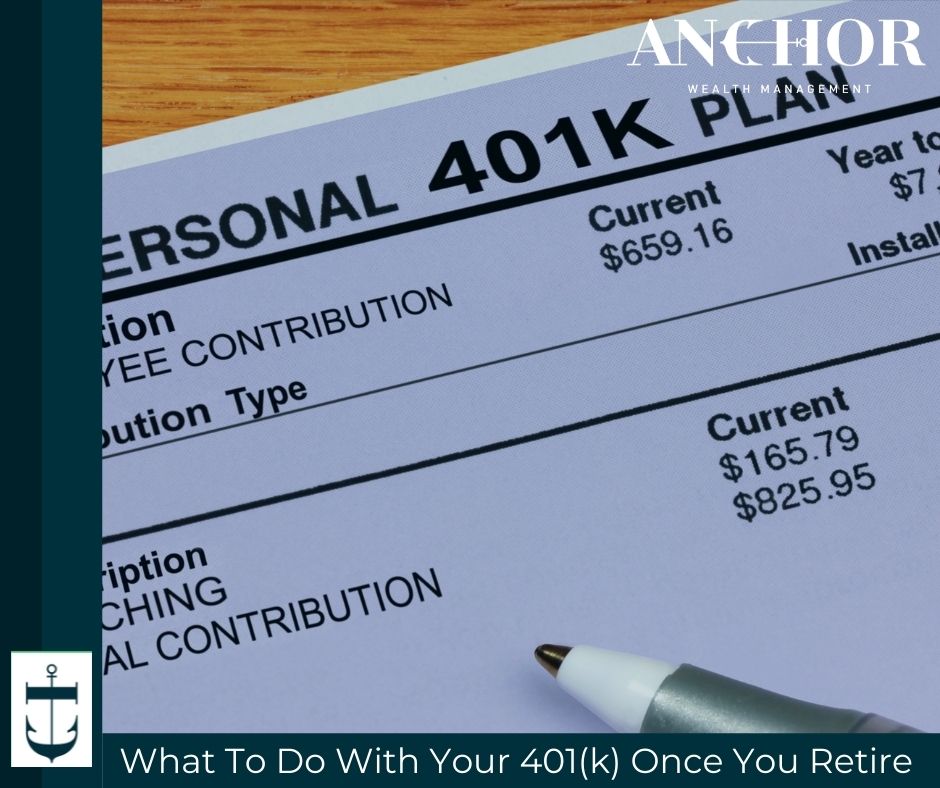
When we talk about retirement, it exists in one of two contexts; either we are planning for retirement or we are enjoying retirement. The context we don’t talk about—and the reason a financial planner can be helpful—is the actual act of retirement. There is a window, ideally at least six months prior to your retirement date, where your plan is put into action and you live in a space where you aren’t planning but you aren’t enjoying yet.
For a lot of my clients, that time is an emotional stew consisting of excitement, apprehension, and trepidation. One of the first questions I answer from my clients is “what do I do with my 401(k) once I retire?” It’s a fair question because the employer-sponsored retirement plan is a great benefit and one that they have earned in exchange for their years of service. While an employer-led 401(k) plan is a generous benefit and one that everyone should take full advantage of, the reality is that most employers are very familiar with how to enroll in the plan during employee onboarding but often less knowledgeable with the steps necessary to capitalize on the benefits of the plan in retirement.
If HR isn’t able to provide you with all of the answers to your “during retirement” questions, here are some simple recommendations for how to handle your 401(k) at your retirement date.
What Do I Do with My 401(k)?
With a lot of retirement planning, timing is the primary consideration. We evaluate things like anticipated retirement date, how many working days remain in your career, and your tolerance for risk. An employee-sponsored 401(k) offers a little more finality when it comes to planning. The reality of the plan is this; the day you stop working, so do your employer’s contributions to the plan.
Upon your retirement date, you can leave your 401(k) under the stewardship of your employer or you can roll it into a Roth IRA. Under the standard blogging protocol, this would be the section where I make a case for both options and then ultimately tell you that you need to make the decision that is best for you. But that’s not the case here, you should strongly consider moving your 401(k) into a Roth IRA. As mentioned before, an employer-sponsored retirement plan is great, please take full advantage of the benefit and encourage everyone you know to do the same. Most 401(k) plans are built on a target date model. In that model, you select the year you plan to retire and the fund automatically grows increasingly conservative as you near the assigned date. The benefit of this is that it prevents major swings in your retirement funds at a time when you will need that money to live on. Once you reach your retirement date and contributions to the plan are halted, the growth in the account from investments is modest. Upon retirement, you may be able to keep your funds in the plan but federal guidelines will require that you begin taking minimum required distributions at age 72. The conservative nature of these target-date funds often doesn’t keep pace with inflation so if you leave your funds in the 401(k), you can actually come out negative in the long run.
By contrast, Roth IRAs provide a great deal of flexibility in investment strategy. With the help of a financial advisor, a Roth IRA provides better asset diversification and can respond quickly to defend against downside risk. In retirement, this means your money continues to work for you and you continue to benefit from the benefit you have earned. A direct rollover from your 401(k) to a Roth IRA is tax-free and penalty-free. This nontaxable event allows you to continue to build a tax-efficient retirement fund.
Create A Retirement As Unique As You
401(k) plans protect the average interest of a larger group, a Roth IRA allows the investor to create a more customized retirement experience. Unlike your traditional 401(k) target-date plan, your investment strategy can be adjusted to match your plans. And if your plans change, so can your investments! If you have questions about your employer-sponsored retirement plan and what to do with your approaching retirement date, I would be honored to help you navigate your financial journey.
Michelle Boisvert, AFIM, Sr. Wealth Advisor
